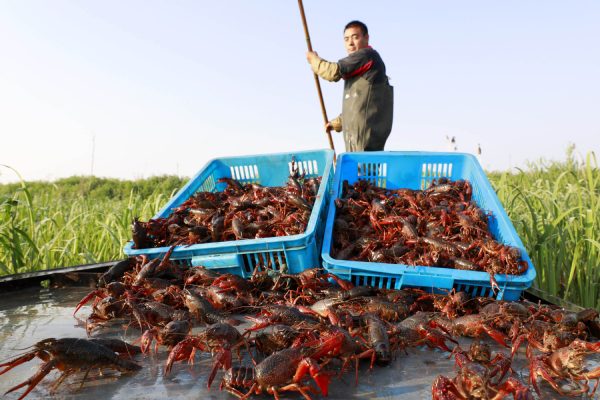
Crawfish, a popular delicacy that appears regularly on Chinese dining tables, has seen its price climb sharply, as the supply fails to keep pace with growing demand. May, when crawfish mature, is the start of the peak season for crawfish eating, which runs until September.
At Guijie, Beijing’s famous food street, it is common for diners to line up for hours to get a taste of crawfish, which can be spicy, garlic, or salty.
Smaller crawfish sell for 7 yuan ($1.1) each at restaurants in Guijie, while larger ones usually retail for 10 yuan. A dish of 20 crawfish can be as expensive as 298 yuan.
“This summer, demand for crawfish will grow significantly with the approach of the World Cup. We plan to supply 100 million crawfish in the whole year. Last year, our sales were below 20 million,” said Wang Shuai, seafood purchasing director of Missfresh, an e-commerce platform that sells and delivers fresh food.
The price of crawfish has been increasing constantly in the past few years. Before, most consumers regarded it as cheap and tasty food and a main dish for late-night snacks. Now, it is no longer cheap, but it is still seeing increasing market demand.
More than 1,500 tons of crawfish were eaten by Chinese consumers last June, and the market value of crawfish surpassed 100 billion yuan in the nation, according to China’s leading group-buying provider Meituan.
“We purchase crawfish at around 80 yuan to 120 yuan per kilogram. Plus labor and other costs such as oil and ingredients, which are expensive, our profits are not that high actually,” said the manager of a restaurant at Guijie.
“Now, more restaurants have started to cook crawfish and the competition among different retailers has become more intense.”
Meanwhile, crawfish appeared in the market earlier this year than usual. In April, crawfish started to appear on a wide scale, but mature crawfish did not reach the market until May. Last April, most crawfish at wholesale markets was sold for 33 yuan to 46 yuan per kilogram. This April, the price picked up to around 60 yuan per kilogram.
Crawfish are mainly from the Yangtze River Delta area. The yield from Hubei, Hunan, Anhui, Jiangsu and Jiangxi provinces accounts for around 95 percent of the total national yield. Of these, most are cultivated in Hubei.
In Hubei, the area for breeding crawfish is increasing by more than 40 percent annually, and the cost of contracting is also rising year by year, as more farmers have seen emerging business opportunities, fueled by the strong demand from crawfish processors, restaurants and small retailers.


